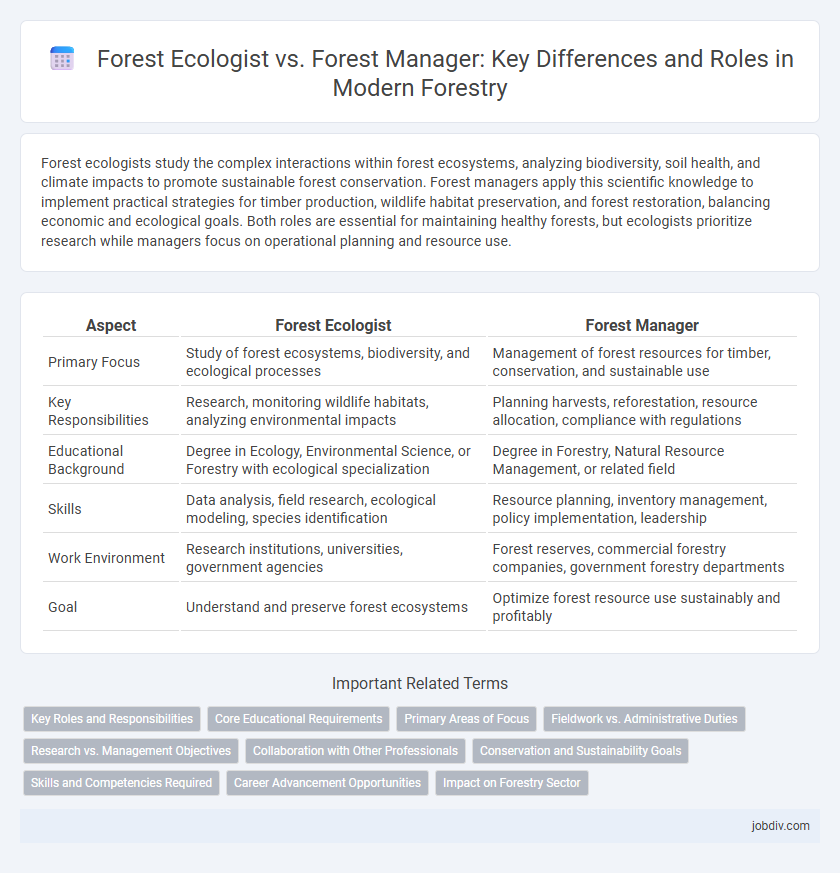Forest ecologists study the complex interactions within forest ecosystems, analyzing biodiversity, soil health, and climate impacts to promote sustainable forest conservation. Forest managers apply this scientific knowledge to implement practical strategies for timber production, wildlife habitat preservation, and forest restoration, balancing economic and ecological goals. Both roles are essential for maintaining healthy forests, but ecologists prioritize research while managers focus on operational planning and resource use.
Table of Comparison
| Aspect | Forest Ecologist | Forest Manager |
|---|---|---|
| Primary Focus | Study of forest ecosystems, biodiversity, and ecological processes | Management of forest resources for timber, conservation, and sustainable use |
| Key Responsibilities | Research, monitoring wildlife habitats, analyzing environmental impacts | Planning harvests, reforestation, resource allocation, compliance with regulations |
| Educational Background | Degree in Ecology, Environmental Science, or Forestry with ecological specialization | Degree in Forestry, Natural Resource Management, or related field |
| Skills | Data analysis, field research, ecological modeling, species identification | Resource planning, inventory management, policy implementation, leadership |
| Work Environment | Research institutions, universities, government agencies | Forest reserves, commercial forestry companies, government forestry departments |
| Goal | Understand and preserve forest ecosystems | Optimize forest resource use sustainably and profitably |
Key Roles and Responsibilities
Forest ecologists analyze ecosystems to understand biodiversity, soil composition, and the impact of environmental changes on forest health. Forest managers develop and implement sustainable harvesting plans, oversee reforestation efforts, and ensure compliance with forestry regulations to balance economic and ecological goals. Both roles collaborate to promote forest conservation, but ecologists emphasize research and monitoring while managers focus on operational planning and resource use.
Core Educational Requirements
Forest ecologists typically require advanced degrees in ecology, biology, or environmental science, emphasizing knowledge in ecosystem dynamics, biodiversity, and conservation principles. Forest managers often pursue degrees in forestry, natural resource management, or environmental management, focusing on silviculture, forest operations, and resource planning. Both roles demand strong foundations in environmental science but differ in specialization; ecologists prioritize research and ecological processes, while managers emphasize applied forest management and sustainable resource utilization.
Primary Areas of Focus
Forest ecologists primarily focus on studying forest ecosystems, biodiversity, and the interactions between plants, animals, and their environment to inform sustainable management practices. Forest managers concentrate on planning, implementing, and overseeing forest resource utilization, including timber production, conservation efforts, and land-use regulations. Both roles emphasize maintaining forest health but approach it from scientific research and practical resource management perspectives, respectively.
Fieldwork vs. Administrative Duties
Forest ecologists predominantly engage in fieldwork, conducting ecological surveys, biodiversity assessments, and habitat restoration to understand forest ecosystems. Forest managers focus more on administrative duties such as planning harvest schedules, managing budgets, and enforcing environmental regulations to ensure sustainable forest use. Both roles require interdisciplinary knowledge but differ in practical versus managerial emphasis within forestry operations.
Research vs. Management Objectives
Forest ecologists primarily conduct scientific research to understand ecosystem dynamics, biodiversity, and the impacts of environmental changes on forest health. In contrast, forest managers focus on implementing sustainable management practices, balancing timber production, conservation, and recreational use to meet economic and ecological goals. The research-driven approach of ecologists informs the practical, goal-oriented decisions made by forest managers to ensure long-term forest sustainability.
Collaboration with Other Professionals
Forest ecologists collaborate closely with wildlife biologists, soil scientists, and conservation planners to assess ecosystem health and biodiversity, ensuring sustainable forest management practices. Forest managers partner with logging engineers, policy makers, and landowners to implement operational plans, balancing economic objectives with environmental regulations. Effective collaboration between forest ecologists and forest managers integrates scientific research with practical application to optimize forest resource stewardship.
Conservation and Sustainability Goals
Forest ecologists analyze ecosystem dynamics, biodiversity, and species interactions to develop strategies that enhance forest health and resilience, emphasizing long-term conservation. Forest managers implement sustainable harvesting plans, oversee reforestation efforts, and maintain regulatory compliance to balance timber production with environmental protection. Both roles collaborate to integrate ecosystem science with practical management, ensuring sustainable resource use while preserving ecological integrity.
Skills and Competencies Required
Forest ecologists require in-depth knowledge of ecosystem dynamics, species interactions, and biodiversity assessment, with strong analytical skills for data collection and environmental impact analysis. Forest managers focus on practical skills in resource planning, forest operations, and regulatory compliance, alongside leadership and decision-making abilities for sustainable forest use and conservation. Both roles demand proficiency in GIS technology, remote sensing, and forest inventory methods to support effective forest management and ecological research.
Career Advancement Opportunities
Forest ecologists primarily advance by deepening expertise in ecosystem research, ecological modeling, and environmental impact assessment, often transitioning into academic roles or specialized consultancy positions. Forest managers enhance career prospects through developing skills in resource management, policy implementation, and operational leadership, frequently moving into senior management or governmental roles. Both career paths offer opportunities for leadership in sustainable forest management and contributing to environmental conservation initiatives.
Impact on Forestry Sector
Forest ecologists contribute to the forestry sector by studying ecosystem dynamics, biodiversity, and the effects of environmental changes on forest health, thereby informing sustainable management practices. Forest managers focus on implementing these practices, optimizing resource use, timber production, and conservation efforts to balance economic goals with ecological sustainability. Together, ecologists and managers drive the integration of scientific research with practical forestry operations, enhancing long-term resilience and productivity of forest landscapes.
Forest Ecologist vs Forest Manager Infographic

 jobdiv.com
jobdiv.com